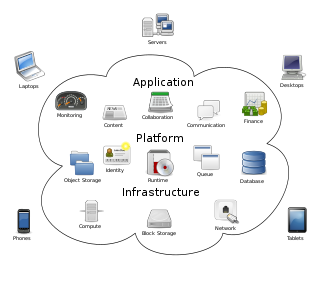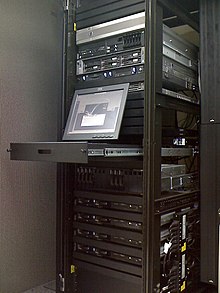
In computer networking, a thin client is a simple (low-performance) computer that has been optimized for establishing a remote connection with a server-based computing environment. They are sometimes known as network computers, or in their simplest form as zero clients. The server does most of the work, which can include launching software programs, performing calculations, and storing data. This contrasts with a rich client or a conventional personal computer; the former is also intended for working in a client–server model but has significant local processing power, while the latter aims to perform its function mostly locally.
A virtual private server (VPS) is a virtual machine sold as a service by an Internet hosting service. The term "virtual dedicated server" (VDS) also has a similar meaning.
A dedicated hosting service, dedicated server, or managed hosting service is a type of Internet hosting in which the client leases an entire server not shared with anyone else. This is more flexible than shared hosting, as organizations have full control over the server(s), including choice of operating system, hardware, etc.
An Internet hosting service is a service that runs servers connected to the Internet, allowing organizations and individuals to serve content or host services connected to the Internet.
Desktop virtualization is a software technology that separates the desktop environment and associated application software from the physical client device that is used to access it.
Hostway is a global web hosting and technology infrastructure company headquartered in Austin, Texas, United States. It provides hosting services to individuals, small to medium-sized businesses, and large corporations with web sites, databases, business applications, and managed web hosting. Hostway Services Inc. merged with Hosting.com in January 2019. The merged company rebranded to Ntirety in September 2019.
Cloud storage is a model of computer data storage in which the digital data is stored in logical pools, said to be on "the cloud". The physical storage spans multiple servers, and the physical environment is typically owned and managed by a hosting company. These cloud storage providers are responsible for keeping the data available and accessible, and the physical environment secured, protected, and running. People and organizations buy or lease storage capacity from the providers to store user, organization, or application data.
Infrastructure as a service (IaaS) is a cloud computing service model by means of which computing resources are supplied by a cloud services provider. The IaaS vendor provides the storage, network, servers, and virtualization (which mostly refers, in this case, to emulating computer hardware). This service enables users to free themselves from maintaining an on-premises data center. The IaaS provider is hosting these resources in either the public cloud (meaning users share the same hardware, storage, and network devices with other users), the private cloud (meaning users do not share these resources), or the hybrid cloud (combination of both).

3PAR Inc. was a manufacturer of systems and software for data storage and information management headquartered in Fremont, California, USA. 3PAR produced computer data storage products, including hardware disk arrays and storage management software. It became a wholly owned subsidiary of Hewlett Packard Enterprise after an acquisition in 2010.
Platform as a service (PaaS) or application platform as a service (aPaaS) or platform-based service is a category of cloud computing services that allows customers to provision, instantiate, run, and manage a modular bundle comprising a computing platform and one or more applications, without the complexity of building and maintaining the infrastructure typically associated with developing and launching the application(s), and to allow developers to create, develop, and package such software bundles.

The Rackspace Cloud is a set of cloud computing products and services billed on a utility computing basis from the US-based company Rackspace. Offerings include Cloud Storage, virtual private server, load balancers, databases, backup, and monitoring.
vCloud Air was a public cloud computing service built on vSphere from VMware. vCloud Air has three "infrastructure as a service" (IaaS) subscription service types: dedicated cloud, virtual private cloud, and disaster recovery. vCloud Air also offers a pay-as-you-go service named Virtual Private Cloud OnDemand.

Cloud computing is the on-demand availability of computer system resources, especially data storage and computing power, without direct active management by the user. Large clouds often have functions distributed over multiple locations, each of which is a data center. Cloud computing relies on sharing of resources to achieve coherence and typically uses a pay-as-you-go model, which can help in reducing capital expenses but may also lead to unexpected operating expenses for users.
ElasticHosts was a computer service provider based in London, England. It was founded in March 2008, and closed on 30 June 2020. It provided a cloud computing service, which used ten data centres; in the United Kingdom, Netherlands, United States, Canada, Hong Kong and Australia.
Linode, LLC was an American cloud hosting provider that focused on providing Linux-based virtual machines, cloud infrastructure, and managed services.

OpenNebula is an open source cloud computing platform for managing heterogeneous data center, public cloud and edge computing infrastructure resources. OpenNebula manages on-premise and remote virtual infrastructure to build private, public, or hybrid implementations of Infrastructure as a Service and multi-tenant Kubernetes deployments. The two primary uses of the OpenNebula platform are data center virtualization and cloud deployments based on the KVM hypervisor, LXD/LXC system containers, and AWS Firecracker microVMs. The platform is also capable of offering the cloud infrastructure necessary to operate a cloud on top of existing VMware infrastructure. In early June 2020, OpenNebula announced the release of a new Enterprise Edition for corporate users, along with a Community Edition. OpenNebula CE is free and open-source software, released under the Apache License version 2. OpenNebula CE comes with free access to patch releases containing critical bug fixes but with no access to the regular EE maintenance releases. Upgrades to the latest minor/major version is only available for CE users with non-commercial deployments or with significant open source contributions to the OpenNebula Community. OpenNebula EE is distributed under a closed-source license and requires a commercial Subscription.

HP Cloud was a set of cloud computing services available from Hewlett-Packard that offered public cloud, private cloud, hybrid cloud, managed private cloud and other cloud services. It was the combination of the previous HP Converged Cloud business unit and HP Cloud Services, an OpenStack-based public cloud. It was marketed to enterprise organizations to combine public cloud services with internal IT resources to create hybrid clouds, or a mix of private and public cloud environments, from around 2011 until 2016.
Cloud computing has become a social phenomenon used by most people every day. As with every important social phenomenon there are issues that limit its widespread adoption. In the present scenario, cloud computing is seen as a fast developing area that can instantly supply extensible services by using internet with the help of hardware and software virtualization. The biggest advantage of cloud computing is flexible lease and release of resources as per the requirement of the user. Other benefits encompass betterment in efficiency, compensating the costs in operations. It curtails down the high prices of hardware and software Although, there are numerous benefits of adopting the latest cloud technology still there are privacy issues involved in cloud computing because in the cloud at any time the data can outbreak the service provider and the information is deleted purposely. There are security issues of various kinds related to cloud computing falling into two broader categories: First, the issues related to the cloud security that the cloud providers face. Secondly, the issues related to the cloud security that the customers experience
Cloud management is the management of cloud computing products and services.

SAP Converged Cloud is a private managed cloud developed and marketed by SAP.








